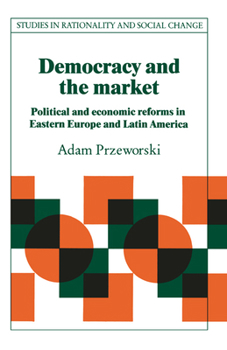Democracy and the Market : Political and Economic Reforms in Eastern Europe and Latin America
(Part of the Studies in Rationality and Social Change Series)
Select Format
Select Condition 
Book Overview
The quest for freedom from hunger and repression has triggered in recent years a dramatic, worldwide reform of political and economic systems. Never have so many people enjoyed, or at least experimented with democratic institutions. However, many strategies for economic development in Eastern Europe and Latin America have failed with the result that entire economic systems on both continents are being transformed. This major book analyzes recent transitions to democracy and market-oriented economic reforms in Eastern Europe and Latin America. Drawing in a quite distinctive way on models derived from political philosophy, economics, and game theory, Professor Przeworski also considers specific data on individual countries. Among the questions raised by the book are: What should we expect from these experiments in democracy and market economy? What new economic systems will emerge? Will these transitions result in new democracies or old dictatorships?
Format:Paperback
Language:English
ISBN:052142335X
ISBN13:9780521423359
Release Date:July 1991
Publisher:Cambridge University Press
Length:228 Pages
Weight:0.55 lbs.
Dimensions:0.6" x 5.5" x 8.5"
Customer Reviews
3 ratings
Best political economy
Published by Thriftbooks.com User , 18 years ago
I read this book in 1995 and I have never found a better one in analyzing democratization since then. His idea on democracy as a result of "spontaneous compliance" is so powerful that nothing else can actually stimulate more on a research direction for the preconditions of democratization process in countries like China. It can be read together with his "Democracy and the Rule of Law", which addresses the question of why governments act or do not act according to laws, and interprets the rule of law as a strategic choice of actors with powerful interests (rather than as an exogenous constraint on politicians), and concludes that the rule of law emerges when no group is strong enough to dominate the others and political actors seek to resolve their conflicts by recourse to law. Unfortunately, Adam Przeworski is later on obsessed with math, statistics, graphs, and aggregate analysis instead going deeper into specific political culture, which is yet another sad example of how mathematical academics continues to ruin more economists and political scientists (States and Markets: A Primer in Political Economy, 2003). The point is, applied mathematics and statistics concern with correlation, social scientists concern with causation. Mathematics and statistics are good tools, but social scientists are not technicians. If all they can do is applying mathematics and statistics without institutional analysis or policy analysis, they are in a wrong career.
Excellent book
Published by Thriftbooks.com User , 25 years ago
Adam Przeworski is one of the top five political scientists of the world. "Democracy and the Market" is amazing and should be read by everybody that wants to know why democracies last (or don't). Przeworski is probably one of the few writers that compare the situation in East Europe with the situation in Latin America. And he does it perfectly. A bit technical at times but a very contemporary work of Political Science. A must buy.
Sophisticated, profound, and interesting!!!!
Published by Thriftbooks.com User , 25 years ago
Przeworski's writing is always penetrating. This is the best work that I've ever read in the literature of political economy and comparative politics. Although his approach is too much immersed in rational-choice, he knows the history of political philosophy. Although he is basically a Marx-oriented scholar, he correctly understand what neo-classical theories are lacking. Adam Przeworki is a rare intellectual who combine science with philosophy. is worth buying and worth reading although somehow technical.






